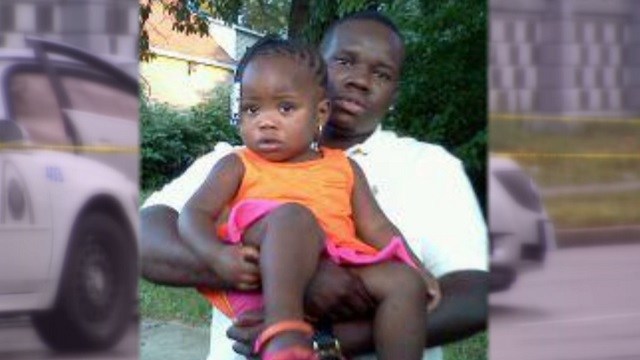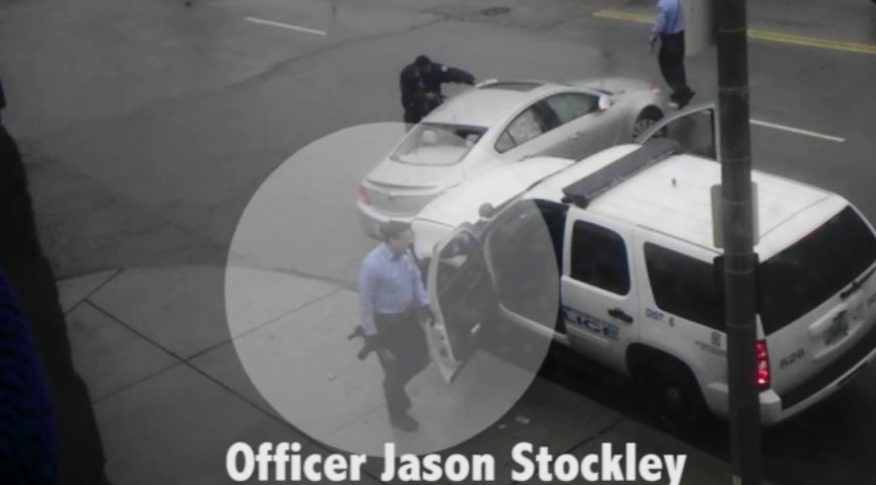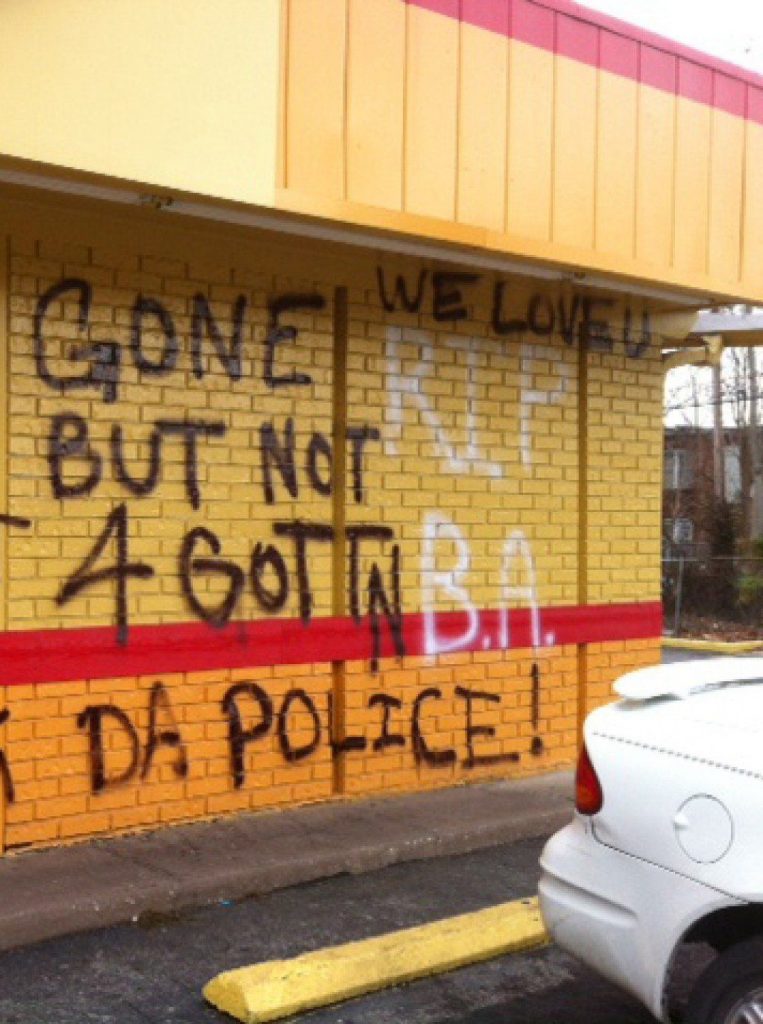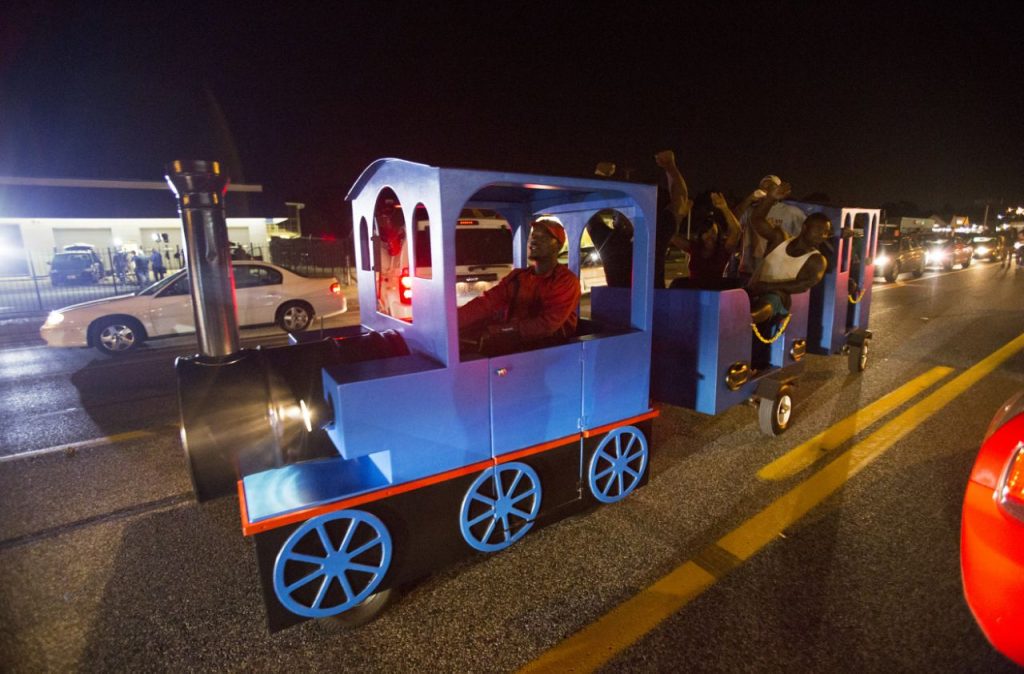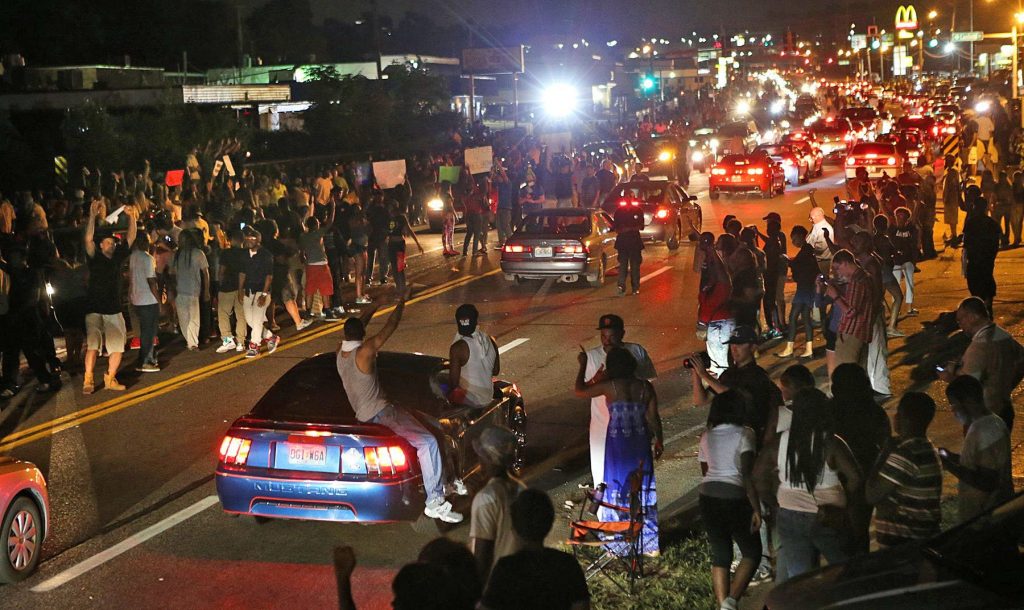(submitted to antistatestl)
The Murder of Anthony Smith
SLMPD Officer Jason Stockley, a military veteran who served a tour in Iraq during the height of the war, murdered Anthony Lamar Smith on December 20th, 2011 on the north side of St. Louis City. Stockley believed Smith was engaged in a drug deal in the parking lot of a Church’s Chicken. He and his partner got out of their cruiser, rushed to Smith’s car, and threatened him. Stockley was carrying his personal AK-47 Draco (a violation of policy) with military grade rounds, looking real mafia-like. He pointed his AK at Smith, and Smith, likely fearing his death, sped off, hitting Stockley and making him drop his AK. As Smith left, Stockley fired 6 rounds from his police issued Beretta, hitting Smith’s car.
The cops ran back to the cruiser and started to chase Smith. There is a dash cam recording from the chase capturing Stockley yelling “Going to kill this motherfucker don’t you know it!” Eventually the cruiser crashed into Smith’s car, immobilizing it. Immediately Stockley got out, rushed to the driver side, and shot Smith dead at a point blank range.
In the immediate aftermath, Stockley goes back and forth to the back seat of his cruiser and rummages through a bag. In a video of this scene (only released because Smith’s family filed a wrongful death suit and won), you can’t see what he grabs, but it is alleged that he is grabbing a “throw down gun”—that is, a gun to lay at a scene, that is unregistered/stolen and can’t be traced to police—to place in Smith’s car, as a way of claiming justification of force. Police investigators eventually test for DNA on the throw down revolver. They find Shockley’s DNA on the gun—on the trigger, grip, and a screw. Smith’s DNA is nowhere to be found.
In an immediate response to Smith’s death, people spray painted the Church’s Chicken with threats that night. “Y’ALL NEXT POLICE”, “FUCK DA POLICE.” Claiming they feared for their safety, the police chief called for SLMPD cops to work in pairs . A week later, a demonstration was called in solidarity with Smith by anarchists. His family and area anarchists showed up.
For the next five years nothing much happened—Stockley continued on the SLMPD force until he quietly “retired” about a year and a half after the murder and moved to Houston, TX. In May 2016, evidence revealed in the wrongful death lawsuit was leaked to media, forcing the hand of the St Louis City Circuit Attorney. Jennifer Joyce, the acting Circuit Attorney at the time, had Stockley extradited and arrested on first-degree murder. His bail was set at ONE MILLION DOLLARS and the city’s police union covered it, releasing him to await trial.
Because a jury comprised of St Louis residents would be much more likely to convict Stockley, the coward requested a bench trial. A bench trial is when a judge, instead of a jury, weighs the testimony, determines the verdict and, if found guilty, sentences. The trial lasted for two weeks, and as of now, the judge is still deliberating,
During the case, Stockley’s lawyer, Neil Bruntrager, argued that Stockley acted within reason. “What happened that day happened because Anthony Smith made decisions,” Bruntrager said. “He was reckless. … Even if no weapon were found, those circumstances would justify the shooting. (Stockley) acted reasonably.”
According to this logic, all one has to do in the city of St Louis to warrant point blank murder is to act recklessly.
It is likely that they’ll prolong announcing the verdict as long as absolutely possible. But it is expected that Stockley will get off, considering how incredibly rare it is for cops to get convicted. And it feels eerily like it did before the non-indictment of Darren Wilson—calls for peace from area politicians, pleading for people to not respond ‘violently’, crash gates going up around potential flashpoints, and the Missouri National Guard waiting in the wings (having been put on notice by Eric Greitens, the state’s relatively new, extremely right wing governor).
The legacy (curse?) and uses of Ferguson and the verdict
As we await the Stockley verdict with baited breath, there’s a new resurgence of the reformist and repressive forces that we saw in the aftermath of Ferguson. The language is different—more militant, more uncompromising, but with untrustworthy underpinnings.
Almost two weeks ago a group of activists and clergy had a press conference on the courthouse steps calling for a guilty verdict. Folks called for action and claimed if Stockley isn’t convicted it “will be a lot like Ferguson.” This certainly struck terror in the halls of power and the next day the city put up barricades at City Hall, the courthouse, and the police station.[1] These statements were strong but also very, very ambiguous. Indeed, days later, some of the clergy—realizing how their call could be interpreted, clarified. In meetings with media, police and the Governor, they made clear they were calling for ‘non-violence.’ But, just yesterday, this did not stop another completely different group of clergy from more or less threatening that if there was a not-guilty decision that the city would have “blood on their hands” and be responsible for any violence. It seems that there are many interpretations of the meaning of the initial press conference (as evidence by the video below), so we will only really know when the day comes.
On the internet, a few articles have started to circle around about the verdict, including one claiming that St. Louis might burn; and predicting based on their supposed expertise that the verdict was going to be last Friday, even going so far as to say “they killed Jesus on a Friday.” So far they’ve been very wrong, but we only hope the burning part is true.
Info video created by supporters in anticipation of the verdict
In these times after Ferguson if anyone—even clergy—called or eluded to anything less than “Ferguson,” they might very well be laughed off the stage. But please excuse us our hesitancy in believing their words—for it was some of the same folks at the press conference whom decried the violence, arson, looting and destruction that was part of righteous resistance in August, 2014. These are the same people who blamed the fires in Ferguson on infiltrators or anarchists.[2] The same people who left those to suffer the consequences for their participation, to suffer alone. We can only hope they have changed their minds, but, even so, many have no trust in them.
The critique of people exploiting rebellion—e.g., those who want social, political or monetary power from their participation—has also come up in the last days, with many different parties currently being accused of exploiting the “movement.” This certainly happened in Ferguson, but the exploiters are often described conspiratorially. The exploitation in Ferguson wasn’t clandestine movement sabotage or ‘outside agitators.’ Exploitation didn’t happen in the streets—no one ‘tricked’ hundreds, and at times upwards of thousands, of people into direct, militant opposition with state forces. More often than not, the media, activists and politicians couldn’t help but listen to and prop up the people who called for a ‘civil dialogue’ while trying to silence those who used a language of direct attack. No one had the time or will ever be able quote the aspirations of those who threw the rocks, shot guns or burnt cop cars—as well as the thousands of people who participated in their own way, whether they brought music, food, conversation, cars, etc.[3] There was an obvious state collusion that took place to pacify the rebellion at all costs wherein all sorts of politicians, and people acting therein, exploited the rebellion to their personal gain or to further their agenda. This was not malicious in all cases; some can be seen as aloof arrogance on the part of those who like to hear their own voices and flex their media/political connections.
The forthcoming preparations for the verdict have been overlaid with the heavy residue left by Ferguson. It’s almost a curse at times. It feels like the political managers that had no control in Ferguson are gearing up to possibly get ahead of the reaction. Unlike Ferguson, the reaction to the verdict will not be so spontaneous.
In the years since the uprising, a sort of street cred around the rebellion has been established in various circles. Being around since “day one” of Ferguson is often a calling card given to naïve new people. But anyone who has some ounce of humility and was there in those terrible and beautiful days, knows that it means very little to say this. In fact, it’s quite insulting, considering how many random people were there on “day one,” or the second day, the third, fourth, tenth—who didn’t have big voices, money, leadership or power. This cred politics has often devolved into various sides claiming they were all there on “day one”, accusing others who were actually there of not being there on “day one.” This “cred politics” is currently being used as a way to set the parameters of the response to Stockley’s verdict.
This environment creates a suspicious and limiting “movement.” If you’re not a known face, much is assumed about your past and your ability to act. Instead of a humbleness that seeks to make connection, that doesn’t assume anything fatal about anyone on first glance, there is often a pathetic contest to prove worth. This ultimately limits the participation of folks who may have been involved in recent struggles but weren’t visible because they have a quieter voice or don’t have a social media presence. It also pushes away those who might have their own connections, experiences in life or in other struggles that may offer creative ideas for resistance. It also presumes that people outside the so-called “movement” do not meet or think about their own ways of fighting where they stand.
These limitations have an effect of creating smaller and smaller groups who start to see those outside their struggle either as apathetic or as minions to recruit. The reality might be that people don’t have the same social or political safety nets that allow them to stay in a movement. Or others just they don’t agree with your politics and are engaged in other sorts of struggle. We work to scrape by, raise kids, lose hope, face trauma, deal with racism, etc.—the so-called “struggle” is daily life. It’s not merely an “issue.” Then when a mass rebellion happens, those who have stuck with organizing around the issues in the slow time—where seemingly ‘apathetic’ people don’t care—position themselves as a cadre of experts or veterans that “stuck it out.” It creates an idea that a small bubble of people constitutes a “movement” which in turn creates an unrealistic picture of its presence and effectiveness.
If there is a not guilty verdict, we can only hope that the resistance we saw in the past years blooms in its own spontaneous way.[4] We have learned time and time again that we all come into these fights with a myriad of reasons, all of us having a multiplicity of perspectives and personalities. People define themselves in their own ways in their daily life and in their rebellion, not merely accepting what society or the State says they are. Much of what passes for rhetoric around anti-racism and class struggle is often too homogenizing and does not often entirely fit the motivations or life experiences of those whom we fight alongside and speak with in the streets, during both rebellion and daily life.[5]
We think it’s bold for people to stand on the courthouse steps and claim that another rebellion will soon sweep across the city. And we hope they’re right, even if they don’t really hope so themselves. Because what it means for it to be like ‘Ferguson’—is that people won’t hold back, they won’t back down, and that we’ll be able to find each other in the streets—a wave of people drunk on rage and elation who aren’t taking orders from anyone to quell their resistance. And let’s remember, while area leaders and clergy call for non-violence, the only reason that the Ferguson rebellion received so much attention and why it inspired other rebellions in other cities, is because exactly what happened in Ferguson, happened.
If Stockley is found not guilty, we’ll see you in the streets! Remember, make the work of the police harder by having each others back in the streets. Mask up and encourage others to do the same. Don’t snitch. If they lock any one away, don’t forget them!
For joyous rebellion and a world without police! Destroy what destroys you!
[1] The sheriff, Vernon Betts, of the court explained his reasoning for the barricades to a protestor asking why, “I’m not going to allow the courthouse to get burned down,” Betts said. “You may not be the one to set the fire. And I’m not accusing you, but I’m going to protect those courts and keep whoever has those intentions from doing that.”
[2] This narrative continues today in some circles, even ones sympathetic to the rebellion. This includes now-prominent BLM activists. The local black paper, the St. Louis American recently published an article about the Stockley verdict and deep inside the piece they state: “Ferguson protests were joined at times by local anarchists and out-of-town arsonists affiliated with the Revolutionary Communist Party, who taught local youth how to make Molotov cocktails.” Even the police spouted this line at the time. Jeff Roorda, the police union head, well-known for making racist and incendiary comments, in his memoir of the rebellion, ‘Ferghanistan: The War on Police,” claims that “white anarchists” taught black people how to burn buildings so as to leave no trace and brought guns to Ferguson—this is funny because it’s not that hard to burn a building and infinitely easier to acquire a gun in Missouri. Maybe the police, media and some supposed anti-racists aren’t so far apart?
[3]
[3] This is not to romanticize or create some more authentic group in all this. It was a diverse crowd with different motivations. There is no doubt that the various tactics people used put people in danger, including from friendly fire. It is only to point out that there’s a reason such people are forgotten or unheard of in the current dominant narratives of Ferguson.
[4] We do not pray for a not guilty verdict, but we know this rarely happens and that either way this system will never actually get us what we want.
[5] The State and others seek to limit our freedom to define ourselves. They impose and enforce strict grand historical narratives of what people are capable of being and doing. The (dis)ability that the State, political organizers and society have imposed upon us through the use of spatial ghettoization, racialization, gender, class, etc are enforced through law, academia, imprisonment, policing, wage labor, capitalism, slavery, etc. They are not enforced equally to everyone. But this state of things is often refused and attacked in day-to-day life and during rebellion in multiple ways. It is telling that in pretty much every recent struggle “outsiders,” “white anarchists” or some nebulous grouping is blamed for violence or rioting. In Ferguson, this narrative originates with Chief Tom Jackson, on 8/11/14, claiming there were, “a few organized anarchists getting people riled up.” This narrative began in the hollow mouth of the state and then trickled down into the streets. Let us say once and for all how deeply offensive and disempowering this claim is— that a few (white) anarchists could leverage the agency of thousands of people—mostly people of color—to do their bidding for them. How odd and sad it is that black rebellion in 2014 somehow got twisted into a narrative that the rebellion was the product of white people—how awful that people who were resisting their victimization were re-victimized by the very people who claim to help them. These helpers are too shocked to realize that people (particularly people of color who are supposedly too scared to fight) can and do refuse what they’ve been defined as capable of by their oppressors. Fortunately this narrative is starting to die out.
